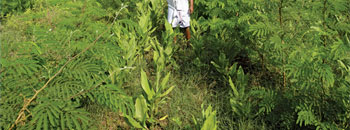|
|
||||||||
|
||||||||
|
||||||||
 |
||||||||
|
|
||||||||
|
|
||||||||
|
||||||||
|
|
||||||||
|
Wood is the major source of fibre for the paper and paperboard industry. Availability of wood remains a major challenge and a serious sustainability concern, specially with forest density and cover in India being far short of the desirable 33%. ITC’s paperboards mill at Bhadrachalam manufactured over 283,470 tonnes of paperboards in 2006-07, requiring 273,656 tonnes of wood, apart from waste paper and some special pulp. ITC has effectively leveraged its need for wood fibre to provide significant opportunities to the economically backward by helping them raise plantations. ITC’s forestry project aims at building grassroots capacities to initiate a virtuous cycle of sustainable development. ITC’s Research and Development has evolved high yielding, site specific, disease resistant clones and a comprehensive package of plantation management practices. ITC distributed 119 million high quality saplings to farmers during the year. Apart from the obvious benefits of increasing the green cover, this effort also directly contributes to in-situ moisture conservation, ground water recharge and significant reduction in top soil losses due to wind and water erosion. As a result of the leaf litter from multi species plantations and the promotion of leguminous intercrops, depleted soils are constantly enriched. Over 91% of the Bhadrachalam mill's total wood requirement came from plantations under its forestry project. Only 946 tonnes (0.35%) was sourced from private farmlands. The mill also utilised 86,219 tonnes of waste paper. Its bamboo requirement of 15,155 tonnes was sourced from government authorised/approved open market sale. ITC does not buy wood-based raw materials from unidentified sources. The Bhadrachalam mill, the only unit in ITC with pulping facilities, is ISO 9001 certified and ensures traceability of all the wood used in its manufacturing process. ITC is committed to greening 100,000 hectares in the next
few years under its forestry programme. This would far exceed the wood fibre requirement for its paperboards business,
create livelihood opportunities for a very large number of
people in tribal areas and sustain ITC’s position as a ‘carbon positive’ corporation. |
||||||||
|
||||||||
|
||||||||





